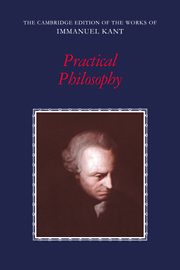Book contents
- Frontmatter
- Contents
- General editors' preface
- Preface
- General introduction
- Review of Schulz's Attempt at an introduction to a doctrine of morals for all human beings regardless of different religions (1783)
- An answer to the question: What is enlightenment? (1784)
- On the wrongfulness of unauthorized publication of books (1785)
- Groundwork of The metaphysics of morals (1785)
- Review of Gottlieb Hufeland's Essay on the principle of natural right (1786) [translated and edited by Allen Wood]
- Kraus's review of Ulrich's Eleutheriology (1788)
- Critique of practical reason (1788)
- On the common saying: That may be correct in theory, but it is of no use in practice (1793)
- Toward perpetual peace (1795)
- The metaphysics of morals (1797)
- On a supposed right to lie from philanthropy (1797)
- On turning out books (1798) [translated and edited by Allen Wood]
- Editorial notes
- Glossary
- Index of names
- Index of subjects
On a supposed right to lie from philanthropy (1797)
Published online by Cambridge University Press: 05 June 2012
- Frontmatter
- Contents
- General editors' preface
- Preface
- General introduction
- Review of Schulz's Attempt at an introduction to a doctrine of morals for all human beings regardless of different religions (1783)
- An answer to the question: What is enlightenment? (1784)
- On the wrongfulness of unauthorized publication of books (1785)
- Groundwork of The metaphysics of morals (1785)
- Review of Gottlieb Hufeland's Essay on the principle of natural right (1786) [translated and edited by Allen Wood]
- Kraus's review of Ulrich's Eleutheriology (1788)
- Critique of practical reason (1788)
- On the common saying: That may be correct in theory, but it is of no use in practice (1793)
- Toward perpetual peace (1795)
- The metaphysics of morals (1797)
- On a supposed right to lie from philanthropy (1797)
- On turning out books (1798) [translated and edited by Allen Wood]
- Editorial notes
- Glossary
- Index of names
- Index of subjects
Summary
Introduction
In 1796 Benjamin Constant, a French politician and author, published a pamphlet entitled Des réactions politiques. The following year a translation was published in the journal Frankreich im Fahr 1797, apparently edited by Karl Friedrich Cramer. In a note Cramer said that Constant had told him that Kant was the “German philosopher” he referred to as holding a view about lying that would make society impossible. Granting that he had “somewhere or other” put forward the view, Kant undertook to refute the “French philosopher's” conclusion that it would make civil society impossible. Kant's reply was published in the September issue of the Berliner Blätter, founded by Biester after publication of the Berlinische Monatsschrift had been discontinued. (See Biester's letters to Kant of August 5 and September 20, 1797, 12:191–2 and 200–1.)
In The Doctrine of Right, published in January 1797, Kant had included, in everyone's innate right to freedom, one's being authorized to communicate one's thoughts to others, to tell or promise them something “whether what he says is true and sincere or untrue and insincere; for it is entirely up to them whether they want to believe him or not.” Contractual rights are acquired by the two acts of promising and accepting; only then does failure to fulfill one's promise deprive another of what is his. However, Kant later distinguished between “what is only formally wrong and what is also materially wrong,” a distinction that “has many applications in the doctrine of right.”
- Type
- Chapter
- Information
- Practical Philosophy , pp. 605 - 616Publisher: Cambridge University PressPrint publication year: 1996
- 18
- Cited by

